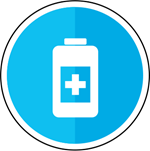The COVID-19 vaccine is here, what's next?
Two COVID-19 vaccines, (created by pharmaceutical company Pfizer and biotechnology company Moderna), have been authorized by the US Food and Drug Administration (FDA) for immediate use. After performing a strict review for safety and effectiveness, the FDA has granted an Emergency Use Authorization (EUA).
What is an EUA?
 An Emergency Use Authorization (EUA) is a mechanism to facilitate the availability and use of medical counter- measures, including vaccines, during public health emergencies, such as the current COVID-19 pandemic. To grant an EUA, the FDA conducts a thorough evaluation of the available safety, effectiveness and manufacturing quality information. Therefore, by authorizing these vaccines via EUA, the FDA has confirmed that product data supports that the known and potential benefits outweigh the known and potential risks. Under the terms of the EUA, Pfizer and Moderna must track and report adverse events that are a result of the vaccine directly to the Vaccine Adverse Event Reporting System or VAERS. This is a national early warning system to detect possible safety problems with vaccines. This reporting system is also for the general public to use and is co-managed by the CDC and the FDA.
An Emergency Use Authorization (EUA) is a mechanism to facilitate the availability and use of medical counter- measures, including vaccines, during public health emergencies, such as the current COVID-19 pandemic. To grant an EUA, the FDA conducts a thorough evaluation of the available safety, effectiveness and manufacturing quality information. Therefore, by authorizing these vaccines via EUA, the FDA has confirmed that product data supports that the known and potential benefits outweigh the known and potential risks. Under the terms of the EUA, Pfizer and Moderna must track and report adverse events that are a result of the vaccine directly to the Vaccine Adverse Event Reporting System or VAERS. This is a national early warning system to detect possible safety problems with vaccines. This reporting system is also for the general public to use and is co-managed by the CDC and the FDA.
How do the mRNA vaccines from Pfizer and Moderna work?
 COVID-19 mRNA vaccines will not give you COVID-19. mRNA vaccines do not use the live virus that causes COVID-19.
COVID-19 mRNA vaccines will not give you COVID-19. mRNA vaccines do not use the live virus that causes COVID-19.
- mRNA vaccines are a new type of vaccine to protect against infectious diseases.
- mRNA does not put a weakened or inactivated germ into the body to trigger an immune response.
- mRNA teaches the cells how to make a protein — or even just a piece of a protein — that triggers the production of antibodies to protect us from infection from the actual virus. (Understanding mRNA Vaccines, 2020)
What else do we know?

- Both vaccines were found to be around 95% effective.
- Both vaccines will be administered in two separate doses, three to four weeks apart.
- Each vaccine also may cause temporary side effects, which may include fatigue, headaches, muscle aches and injection-site tenderness.
- The CDC requires that each vaccine recipient be monitored on site for at least 15 minutes after vaccination.
- Both vaccine manufacturers caution and the CDC advises that the vaccine should not be administered to individuals with a known history of a severe allergic reaction (e.g., anaphylaxis) to any of the vaccines’ ingredients (see the factsheets below for each vaccine). The second dose should not be administered if you had a severe reaction after the first dose.
- An allergic reaction is considered severe if the person must be treated with epinephrine or an EpiPen or if they must go to the hospital.
- Pregnant and breastfeeding women may choose to be vaccinated.
- The Pfizer vaccine was approved for people 16 years of age and older. The Moderna vaccine was approved for people 18 years of age and older.
- The vaccines may be administered to persons with underlying medical conditions, including autoimmune disease.
- Individuals who have already had COVID-19 can be vaccinated. Individuals do not need to be tested for the coronavirus prior to vaccination.
- More vaccines to come: Two more vaccine providers, Johnson and Johnson and AstraZeneca, may be applying for EUAs in February.
-->